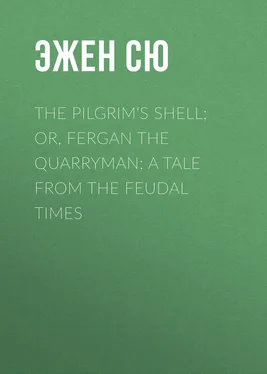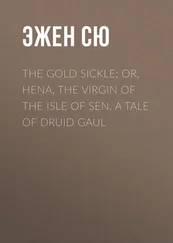Эжен Сю - The Pilgrim's Shell; Or, Fergan the Quarryman - A Tale from the Feudal Times
Здесь есть возможность читать онлайн «Эжен Сю - The Pilgrim's Shell; Or, Fergan the Quarryman - A Tale from the Feudal Times» — ознакомительный отрывок электронной книги совершенно бесплатно, а после прочтения отрывка купить полную версию. В некоторых случаях можно слушать аудио, скачать через торрент в формате fb2 и присутствует краткое содержание. Издательство: Иностранный паблик, Жанр: literature_19, foreign_antique, foreign_prose, на английском языке. Описание произведения, (предисловие) а так же отзывы посетителей доступны на портале библиотеки ЛибКат.
- Название:The Pilgrim's Shell; Or, Fergan the Quarryman: A Tale from the Feudal Times
- Автор:
- Издательство:Иностранный паблик
- Жанр:
- Год:неизвестен
- ISBN:нет данных
- Рейтинг книги:3 / 5. Голосов: 1
-
Избранное:Добавить в избранное
- Отзывы:
-
Ваша оценка:
- 60
- 1
- 2
- 3
- 4
- 5
The Pilgrim's Shell; Or, Fergan the Quarryman: A Tale from the Feudal Times: краткое содержание, описание и аннотация
Предлагаем к чтению аннотацию, описание, краткое содержание или предисловие (зависит от того, что написал сам автор книги «The Pilgrim's Shell; Or, Fergan the Quarryman: A Tale from the Feudal Times»). Если вы не нашли необходимую информацию о книге — напишите в комментариях, мы постараемся отыскать её.
The Pilgrim's Shell; Or, Fergan the Quarryman: A Tale from the Feudal Times — читать онлайн ознакомительный отрывок
Ниже представлен текст книги, разбитый по страницам. Система сохранения места последней прочитанной страницы, позволяет с удобством читать онлайн бесплатно книгу «The Pilgrim's Shell; Or, Fergan the Quarryman: A Tale from the Feudal Times», без необходимости каждый раз заново искать на чём Вы остановились. Поставьте закладку, и сможете в любой момент перейти на страницу, на которой закончили чтение.
Интервал:
Закладка:
After a moment's silence the Bishop of Nantes resumed with a melancholy smile: "Stoics, like the philosophers of antiquity, let's consider at this very moment of imminent torture and death the dogmas that bear upon our present situation."
"Let's commence with the great question of the spiritual and temporal dominion of the church."
"It is a grand subject. I listen."
"In our days, for every twenty abbots or bishops who are sovereign in their abbeys or bishoprics, are there not a hundred dukes, counts, marquises or seigneurs, sovereign masters in their dukedoms, counties or seigniories?"
"Sad to say, 'tis so!"
"Did not a large portion of the estates, that proceeded from the gifts of Charles Martel, return to the hands of the clergy at the time of the terror the people were seized with at the thought of the end of the world, – a terror ably fomented by the church down to the year 1000, and prolonged to 1033 by dint of able maneuvers?"
"That's true, too. The terrified seigneurs abandoned to the church a large part of their goods, thinking the day of judgment was at hand. Since then, however, the same seigneurs, or their descendants, retook their rich donations from the clergy. The hatred that the Count Neroweg pursues me with has no other cause than the recovery of the lands that his grandfather bequeathed to my predecessor, at the time when those brutes expected to see the end of the world. The Count wages war against me to re-enter upon domains that once belonged to his family. The lance is rising against the holy water sprinkler."
"It has been so in all the other provinces. One of the causes of the wars of the seigneurs against the bishops and abbots has, for the last fifty years, been the recovery of the goods given to the Church on the occasion of the end of the world. In these impious strifes the seigneurs have almost always come out on top. The church was vanquished."
"It is a sad fact."
"In order to recover its omnipotence, the Church must again become richer than the seigneurs. She must, above all, rid herself forever of those brigands who dare reach out a sacrilegious hand towards the goods of the Church, and assault the priests of our Lord, the ministers of God."
"Alack, Jeronimo, it is a far way from the wish to the fact! The sword gets the best of the bishop's crook!"
"The distance is simply the journey from here to Jerusalem. That's all!"
The bishop regarded the monk with amazement, repeating without understanding the words: "The journey from here to Jerusalem!"
"I am a legate of Pope Urban II." proceeded Jeronimo. "As such, I am initiated in the policies of Rome. The French Pope Gerbert, and, after him, Gregory VII., conceived a great idea – to submit the peoples of Europe to the papal will. In order, however, to habituate them to a passive obedience, an ostensible purpose had to be held out. Gerbert conceived the thought of the deliverance of the tomb of Christ, which had fallen into the hands of the Saracens, the masters of Syria and Jerusalem. This pregnant thought, conceived in the head of Gerbert and hatched out by Gregory VII., was the subject of long cogitations on the part of their successors. The Popes recommended to the faithful the pilgrimage to Jerusalem, to which they attached special indulgences and privileges. The people of Germany, of Spain, of Gaul, of England, gradually began to hear Jerusalem, the Holy City, talked about. The pilgrimages multiplied. Long though the voyage was, it did not seem impossible; moreover, it insured indulgences for all crimes, and, above all, it was a pleasure trip for the mendicants, the vagabonds, the runaway serfs from the domains of their masters. The pilgrims found good lodgings in the abbeys; they picked up some little money in the cities, and obtained free passage on the Genoese or Venetian vessels as far as Constantinople, where they then departed for Jerusalem, traversing Syria and lodging over night from convent to convent. Arrived at the Holy City, they paid their devotions."
"And all that without any interference on the part of the Saracens. We must admit it among ourselves, Jeronimo, those miscreants showed themselves quite tolerant! The churches rose in peace beside the mosques; the Christians lived in tranquility, and the pilgrims were never incommoded."
"And it remained so," continued Jeronimo, "until the Saracens, exasperated by the anathemas hurled at the sectarians of Mahomet by the Catholic priests of Jerusalem, brought their hammer down upon the holy Temple of Solomon and demolished it – a demolition, however, that we avenged upon Jews by massacring them in the several countries of Europe. But after all, we cared little about the destruction of the Temple, or the safety of the Sepulchre. Our end was attained. The people had learned to know the road to Jerusalem. The sandals of the pilgrims had smoothed the road to the Holy Land to the Catholic peoples. The number of pilgrims increased from year to year. Often seigneurs, certain to obtain by means of that pious voyage the absolution of their crimes, joined the pilgrim vagabonds and beggars. That perpetual flux and reflux of peoples of all stations drew ever more the eyes of Europe to the Orient. The marvels narrated by the pilgrims upon the return from their long voyage, the relics that they brought back, the respect with which the Church surrounded them, – everything affected more and more the spirit of credulity and the vulgar imagination of the masses. Gregory VII. foresaw these results. He considered it opportune to preach the Holy War. The Church raised her voice: 'Shame and sorrow upon the Catholic world! The Sepulchre of the Saviour of man is in the power of the Saracens! Kings and seigneurs, march at the head of your peoples to the deliverance of the Sepulchre of Christ and the extermination of the infidels.' To that premature appeal Europe remained indifferent. The hour of the Crusades had not yet sounded. Since then, however, the idea has made progress, and to-day we are certain to find the minds disposed to second the Pope in his projects. Accordingly, Urban II. has not hesitated to leave Rome and come to preach the Crusade in Gaul, the Catholic country par excellence! "
"What say you? The Pope himself is coming to preach the Crusade! Can that be true, oh, my God!"
"His Holiness is bound for Auvergne, and he sends his emissaries into the other provinces."
"And who are the men invested with the confidence of the Pope, and charged with leading such an undertaking to a successful end?"
"One of them, Peter the Hermit, vulgarly called 'Cuckoo Peter,' is a monk who has twice accomplished the pilgrimage to Jerusalem. He is an ardent man, gifted with a savage eloquence that exercises upon the multitudes a powerful effect. Another emissary is Walter the Pennyless, a knight of adventure, bold Gascon, charged to seduce with the cheerfulness of his words and the exaggeration of his descriptions all those who might remain indifferent to the savage eloquence of Peter the Hermit."
"But what arguments will these emissaries advance in order to rouse the masses to these insensate migrations?"
"I shall answer that question presently. But let me remind you of the principal motives of the church to drive the people to the Crusades; to habituate Catholic Europe to rise at the voice of the Pope for the extermination of heretics; to switch off to Palestine a large number of the seigneurs who are contending with the Church for the goods of the earth and the dominion of the people, – to get rid of one's enemies."
"The idea is good, profound, politic. I can well see the object that the Pope has in view."
"Let me, furthermore, call your attention to a fact that renders necessary a large migration of the common people to the Holy Land. In Gaul, despite the private wars of the seigneurs and the sufferings of this century, the population of the serfs has multiplied to an extraordinary degree during the last fifty years."
Читать дальшеИнтервал:
Закладка:
Похожие книги на «The Pilgrim's Shell; Or, Fergan the Quarryman: A Tale from the Feudal Times»
Представляем Вашему вниманию похожие книги на «The Pilgrim's Shell; Or, Fergan the Quarryman: A Tale from the Feudal Times» списком для выбора. Мы отобрали схожую по названию и смыслу литературу в надежде предоставить читателям больше вариантов отыскать новые, интересные, ещё непрочитанные произведения.
Обсуждение, отзывы о книге «The Pilgrim's Shell; Or, Fergan the Quarryman: A Tale from the Feudal Times» и просто собственные мнения читателей. Оставьте ваши комментарии, напишите, что Вы думаете о произведении, его смысле или главных героях. Укажите что конкретно понравилось, а что нет, и почему Вы так считаете.












